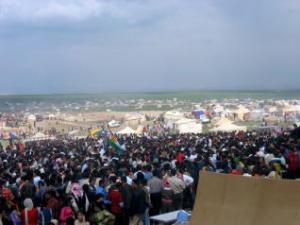
Syrian Kurds – bolder, but still oppressed

The Damascus Bureau - 27/7/2010
As the largest ethnic minority in Syria, Kurds were hoping in 2000 that their political, social and cultural rights would be finally recognised under the new president. But the past ten years proved to be disappointing.
Despite being a repressed minority in Syria, Syrian Kurds over the last ten years have become more vocal in asserting their political, social and cultural rights, local analysts and political dissidents say.
Following the death of Hafez al-Assad in 2000 and the accession of his son, Bashar, to power, the Kurds became bolder, staging sit-ins and protests to demand an improvement in their conditions. Kurdish political parties multiplied.
But this emerging rights movement came at a hefty price. The Syrian authorities have responded by becoming more repressive, resorting routinely to the imprisonment of Kurdish political figures and violently quelling Kurdish cultural and political protests.
Starting in 2000, during a moment of brief internal openness, Kurds organised public debates to ask for more rights as part of a general quest by a number of intellectuals and dissidents from a spectrum of political groups to bring about democratic reforms in the country.
But the authorities quickly reacted to put an end to this peaceful protest movement. Kurdish dissidents were among the tens of activists who were imprisoned back then. However, despite the overall crackdown on political activities that year, Kurds continued to resist.
In December 2002, a Kurdish political party organised a sit-in in front of the parliament to call on authorities to ease restrictions imposed on Kurdish culture and language, and acknowledge that Kurds are the second largest ethnic group in the country.
The protest was repressed and two of its leaders were sentenced to jail for fourteen months. Since then, the authorities have cracked down on any form of peaceful demand for Kurdish rights.
Kurds represent around ten per cent of the Syrian population, which is around 20 million people. But some estimates believe that their number could be as high as three million. Kurds mainly live in the northern and eastern parts of the country as well as big cities such as Damascus and Aleppo.
Discrimination against Kurds is not only political but also social and cultural. Unlike its treatment of other minorities in the country, such as Assyrians and Armenians, the Syrian regime forbids Kurds from building private schools, teaching their language, giving their businesses and children Kurdish names or publishing books in Kurdish.
Another main ongoing form of injustice in the eyes of the Kurds is the continued denial to 300,000 of them of Syrian citizenship. In 1962, the government stripped 120,000 Kurds living in north-eastern areas of their nationality, claiming that they had crossed the border illegally from neighbouring countries.
These Kurds and subsequently their children became categorised as “foreigners” and have been deprived of many of their civil rights.
In 2003, a protest calling for stateless Kurds to regain their citizenship was also halted. Several Kurdish activists were again jailed.
March 2004 Protest
The peak of the government’s repression of Kurds happened in March 2004 when security officials opened fire on a group of protesters, killing at least 36 people and injuring 160 more, according to local and international human rights groups. Around two thousands were arrested.
This incident, which has been branded by many Kurds as their uprising, took place a day after a scuffle during a local football match between an Arab and Kurdish team. But many believed that the subsequent unrest was the result of a deeper resentment of the government’s policies towards the Kurds.
Kurds are among the poorest groups in the country although they live in areas that are rich in oil and other natural resources. Kurdish political dissidents accuse the authorities of neglecting their regions and subjecting them to the corrupt and ruthless rule of security services.
One Kurdish dissident says that the bloody 2004 incident had a detrimental effect on the way Kurds regarded the Syrian regime. It turned the government into “the enemy” in the eyes of most of the Kurds, he added.
The 2004 protests gave Kurds a boost of confidence to press for more rights and greater autonomy, concluded an extensive reporton Kurds published in November 2009 by the New-York based organisation Human Rights Watch.
The report added that the sheer size of the 2004 protest worried Damascus, which was facing international isolation and nervous about the autonomy of Kurds in Iraq. The Syrian regime responded in the more than five years since March 2004 by maintaining “a harsh policy of increased repression against its Kurdish minority”, the report noted.
In 2005, the assassination of a popular Kurdish Sheikh, Mohamad Mashouq Al-Khaznawi, poured oil on the fire. The sheikh was abducted in Damascus and later found dead. Many Kurds accused the government of killing him. Officials have denied the claim.
Observers believe a shift in the policies of the Syrian regime towards Kurds in neighbouring countries and the improvements of the situation of Kurds in Iraq and Turkey were behind the important changes in relations between Kurds and the Syrian government that occurred in the last decade.
The strategy of Hafez al-Assad
During his rule, Bashar’s father managed to rally Syrian Kurds behind him by giving support to Kurdish rebellious movements in Iraq and Turkey, a strategy he sought in order to weaken his neighbours.
Hafez had supported Iraqi Kurds since the 1970s against the regime of Saddam Hussein in Baghdad.
He also continued to provide shelter to the PKK, the armed Turkish Kurdish resistance movement, until 1998 when this support threatened to ignite a war with Turkey.
Since then, the support for Turkish Kurdish separatist groups has ceased as Damascus and Ankara moved to have warmer relations especially in the past couple of years.
Recently, Turkish official media reported that Syrian security officials have detained 400 people suspected of links to the PKK. Kurdish rights groups called the accusations “baseless and politically motivated” and added that the arrests were aimed at “quelling” opposition to the regime.
Some analysts believe that the strategy of Hafez, who backed Kurds in the region and promoted some Syrian Kurdish figures to prominent positions, managed to put a lid on any internal Kurdish resistance movement.
But when his son took the reins of power at the dawn of the new millennium, Kurds felt it was the right opportunity for them to turn attention to their internal situation.
Furthermore, the improvement of the situation of Kurds in Turkey and earlier in Iraq, especially after the United States-led invasion in 2003, encouraged Syrian Kurds to fight for political recognition.
Since 2000, Kurds have joined forces with other opposition groups even though relations between them and the rest of the opposition could be sometimes rocky.
Seeking Political Recognition
Today, there are more than sixteen different Kurdish political groups that actively work on mustering popular support to assert their minority rights. All of these parties, however, like all the other parties that are not under the umbrella of the Baath party, remain illegal.
Some observers say that divisions among those parties have weakened the Kurdish rights movement.
Although the authorities tolerate the existence of Kurdish parties to a certain degree, they routinely round up their leaders.
Currently, four Kurdish political cadres, Mashal al-Tammo, Mustafa Jouma, Saadoun Shaekho, and Muhammad Said Hussein, are serving jail sentences and three others are on trial at the state security court.
They are accused of spreading false news, belonging to a secret organisation and conspiring to annexing Syrian land to a foreign country – all of which are charges usually used by the regime against Kurdish dissidents.
Several other Kurdish leaders are currently on trial for similar reasons. One lawyer from Qamishli, one of the main bastions of Kurds in Syria, remarked that cases against Kurdish activists have significantly increased in the past ten years.
Kurds have been victims of a decades-long staunch Arab nationalist policy. They are often accused of lacking loyalty to the nation and aspiring to form their own state and gain autonomy, even though most Kurdish groups do not openly demand the severance of their regions from Syria.
Observers say that in addition to arbitrary detentions, the authorities have been resorting to large-scale measures that affect the livelihood of a big number of Kurds.
Discrimination in daily life
For instance, in 2008, a governmental decision made it more difficult for Kurds to buy and sell property in the Hasakeh areain the north-east. This decision, in addition to three years of a severe drought, have caused the displacement of thousands of Kurds from their lands.
Most of them live today in dire conditions in shantytowns around big cities.
Some observers say that the government pursues an active policy to change the demography of Kurdish areas and break the contiguity of Kurdish territories, a strategy that was in evidence in the 1970s.
Repression of Kurds also happens during cultural celebrations.
This year, during the marking of Nowruz, a yearly occasion when Kurds welcome the coming
of spring, at least two Kurdish revellers were reportedly killedin confrontations with police forces.
Every year, tensions rise between Kurds and authorities during this period.
Kurdish political groups agree today that the government has no intention to grant them more rights as an ethnic minority. And many believe that conditions for the community can only improve with the advancement.
- Add new comment
- 4862 reads
- العربية


